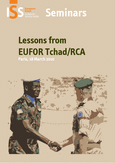You are here
Lessons from EUFOR Tchad/RCA

The EUFOR Tchad/RCA lessons learned seminar hosted by the Institute on 18 March facilitated a debate on the effectiveness of the EU mission in Chad. The discussions resulted in a number of recommendations for the planning, conduct and execution of subsequent EU operations and generated several ideas for the future of the CSDP. The EUFOR Tchad/RCA seminar held in Paris on 18 March 2010 was convened with the purpose of identifying lessons for the planning, conduct and execution of future EU operations and missions, to build upon existing ‘lessons identified’ processes, and to share lessons on the comprehensive aspects of EU operations. Debates were open and frank and lead to very valuable exchanges of views among representatives from various communities of expertise. There was a consensus among seminar participants that the operation went technically well and that it contributed to the strengthening of CSDP. The concluding session highlighted a number of ideas for the future of the CSDP. First, subsequent EU operations will require strong evidence of and guarantees that the host government fully accepts and understands its rationale and its purpose. In the future, in-depth foreign policy consultations with the host government should be held as early as possible to inform the design of a detailed political strategy at the EU level. By doing so, the EU will capitalise on striking a fair balance between the efficiency and legitimacy of its future operations. Second, one participant inquired as to whether CSDP operations on the African continent will in the future be led or initiated by a nation other than France, which was the lead nation for logistics and the main contributor and planner of the EUFOR Tchad/RCA operation.
However - and this is the third and final lesson - EUFOR Tchad/ RCA was cited as an example of what permanent structured cooperation could look like in the future. Fourth, it was confirmed that strategic planning requires more permanent staff and structures. As for EU-UN cooperation, bridging will remain a key concept for joint planning. Structural differences between the two organisations would be addressed by having more systematic joint exercises, training and exchanges.